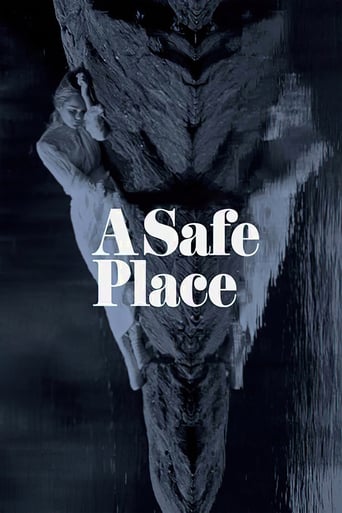moonspinner55
One might be tempted to call Henry Jaglom's directing debut "A Safe Place", which he also wrote (based on material he originally presented on stage in New York), self-indulgent; however, the indulgence here really belongs to the editor, Pieter Bergema. This is a movie 'made' in its editing stages, and either Bergema had too much film to work with or not enough (this might explain the endless close-ups of crying or howling faces, several of them repeated). Tuesday Weld plays a commune-living hippie chick in New York City, on a tightrope between being a woman and wanting to remain a child, who begins a relationship with a drop-out from high society before she has resolved her feelings for former boyfriend Jack Nicholson, who apparently left her for another woman. Jaglom encourages his cast to wing it, and so we're left with lots of rambling, pseudo-introspective monologues about illusion and reality. It's wise not to try and dissect "A Safe Place"--that would be like analyzing a snowflake. There's just not enough real substance here--nor enough real acting--to spark a debate on the film. Orson Welles as a magician (or perhaps Weld's guardian angel) looks like a cross between Jackie Gleason and Oliver Hardy; he has fun doing magic tricks in Central Park, but is mostly used as a shoulder for Weld to lean on. Weld herself is a lovely presence (although this little-girl-lost number was just about played out), and cinematographer Dick Kratina gets some gorgeous shots of her all around the city, but the only genuine acting in the film comes from newcomer Gwen Welles as another hippie who is mesmerized by the non-meaning of her dreams. ** from ****
gavin6942
A strange young woman (Tuesday Weld) lives in a fantasy world where she can never grow up.Henry Jaglom's directorial debut was a "critical and box-office disaster". Time magazine called the film "pretentious and confusing", a film that "suggests that the rumors of his expertise were greatly exaggerated, or at least that it does not extend to directing." Apparently, for the critics, not even the presence of the incredible Orson Welles or Jack Nicholson could save this one.Author Anais Nin was perhaps the most kind. She called the film "an impressionistic film, an X ray of our psychic life, which gives an insight instantly into the secret self." She called it a "masterpiece", and praised it for its dreamlike quality that could only be captured on film.
rooz
Wonderfully bizarre and experimental piece of work for which Jaglom should be very proud. Welles and Nicholson are great in this head game. Let yourself go when you watch this--experience it--this is not a "movie"--this is a trip!! You will get as much out of this as you allow yourself to take.
pedrito
I don't know why I hadn't seen this movie before. I find the script an almost perfect one, closer to poetry than to the novel and a cinema language that owes a lot to Jean Luc Godard but nevertheless contributes to a post-modern comprehension of cinema as an art form in constant evolution. A 'must see' for any serious student of the evolution of cinema.The film's cinematography, with a clear cut preference for close ups, is a contribution to the general epos of the story. A real masterpiece, which I am sure will gain in public aclaim as time passes. A 10 by any standard. Pedro Saad




